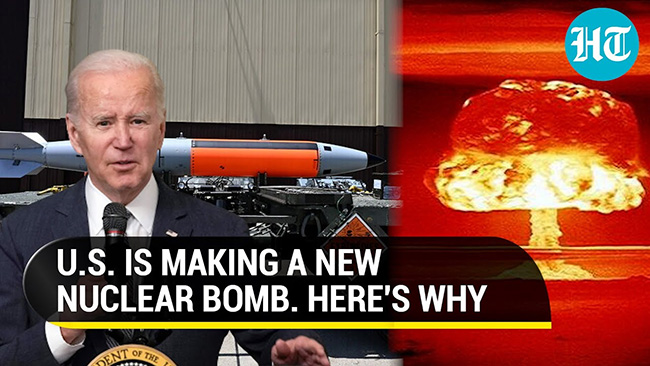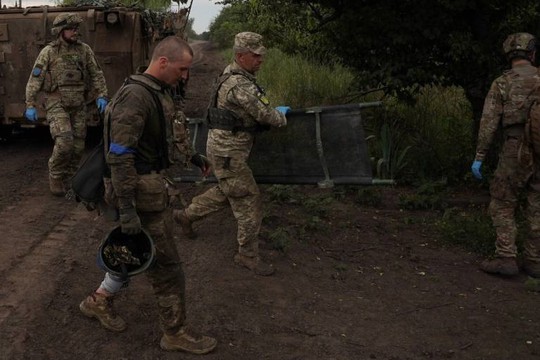An episode in the Ukrainian army
- The US Administration provides another aid package to Ukraine worth $125 million, which will include air defense systems, weapons and vehicles, US Secretary of State Antony Blinken announced.
It is much less than earlier arms packages provided by Washington to Kyiv. It has been authorized under previously directed drawdowns for Ukraine.
The US House of Representatives recently passed a $14.3 billion aid bill for Israel but left out billions President Joe Biden requested for Ukraine amid stiff resistance from Republicans over funding Kyiv. The bill goes to the Senate where it is unlikely to pass and in the face of a White House veto threat.
The newly-elected House Speaker Mike Johnson wisely separated Israeli aid from Ukrainian War spending. In his words, "Both parties support aid for Israel, but aid for Ukraine is highly contentious. Americans ask why our borders are undefended while politicians spend fortunes abroad."
"Unless there is a major event that brings Kyiv back into the headline news which they have not been in since the Israel War began, there will be a lot less money flowing into Ukraine," he added.
Ukraine's budget has been running a deficit of about $5 billion a month since the beginning of Russia's Special Military Operation, with two-thirds of the money coming from foreign loans and grants, and three-quarters spent on military needs, Ukrainian Finance Minister Sergii Marchenko announced earlier in the year.
- Some days ago, General Valery Zaluzhny, the Ukrainian Army’s Сommander-in-Сhief, admitted that Kyiv needed to take a massive technological leap to break the current "stalemate" in its counteroffensive against Russian troops. “There will most likely be no deep and beautiful breakthrough,” he underscored in an interview with the Economist magazine.
Valery Zaluzhny who sometimes is not happy with President Volodymyr Zelensky’s political orders on the battlefield had conceded that “NATO’s textbooks” and “the math” that Kyiv did to plan the much-heralded counteroffensive had failed to prevent Russian forces from effectively tackling Ukrainian troops.
General also ruminated that the aforementioned NATO textbooks and the calculations had suggested that, “four months should have been enough time for us [the Ukrainian army] to have reached Crimea, to have fought in Crimea, to return from Crimea and to have gone back in and out again.” Such task has not been fulfilled at all.
He was referring to the peninsula which opted to split off from Ukraine after the February 2014 Euromaidan coup, voting overwhelmingly in a referendum in March 2014 to rejoin Russia. Ukraine had boasted of plans to use its counteroffensive launched in the summer to seize the Crimea.
In effect, however, no amount of sophisticated and billions-worth of weaponry was able to aid Kyiv in its counteroffensive ambitions.
Ukrainian Сommander-in-Сhief had also added that he was concerned about the fact that "sooner or later we [Kyiv] will realize that we simply don't have enough people to fight."
Valery Zaluzhny’s revelations have not been welcomed by Ukrainian political leaders. They noted that during military operations it is not advisable to open all the cards to an immediate neighbor.
- Ukraine lost over 90,000 servicemen killed and wounded only since start of counteroffensive on June 4, 2023 Russia’s Minister of Defence Sergei Shoigu said on October 30, 2023.
It was added that the Ukrainian counteroffensive had failed to achieve significant success on the battlefield, with the Ukrainian forces losing around 600 tanks and about 1,900 armored vehicles. The Russian Army will continue to "methodically and confidently" carry out assigned tasks in the special military op zone, added the Ministry.
The US-spearheaded Western strategy had been to use Ukraine as a pawn in its proxy war to attempt to “isolate Russia economically, to weaken Russia's military capability, and to strengthen Ukraine as a potential EU and even NATO member,” Karen Kwiatkowski, the retired Polish Lt-Colonel, underscored.
However, “in each of these publicly stated objectives, if there was a strategy to do these things, it backfired and failed in all cases,” he added.
Such “across the board failures” can only mean that “either the strategy was so bad it should have never made it off the table, or failure and destruction was the strategy, just one not publicly stated,” Kwiatkowski stressed.

- The Pentagon announced late last month that it would seek to make a new variant of the B61 nuclear gravity bomb – the B61-13 – pending authorization by Congress. The weapon would have an estimated 360-kiloton yield, which is 24 times more powerful than the one dropped on Hiroshima during World War II by the USA.
The new nuclear bomb will be able to perform both functions: tactical and strategic. It will be deployed in Europe and Asia as a forward-based weapon.
The plan to design a new U.S. A-bomb was unveiled amid the Ukrainian/NATO aggression against Russia, as experts, politicians, and the media have discussed the risks of the conflict escalating into a nuclear war.
Russia has accused the USA of “nuclear brinkmanship” and claimed it was violating arms control agreements.
Russia formally revoked its ratification of the 1996 Comprehensive Nuclear-Test-Ban Treaty or CTBT. President Vladimir Putin said the non-proliferation treaty has become useless because it was never ratified by the US side since 1996. “Among the states that have not ratified the treaty, the most destructive position is that of the US, which has for many years declared that there would be no support for ratifying the treaty in Congress,” the Kremlin said in a statement.
Putin stressed that Russia would not carry out nuclear tests unless the USA does so first.
read more in our Telegram-channel https://t.me/The_International_Affairs

 11:16 07.11.2023 •
11:16 07.11.2023 •























